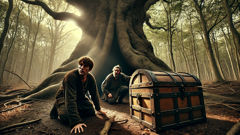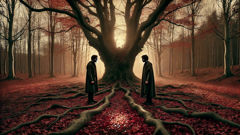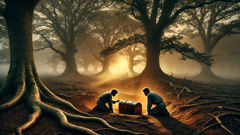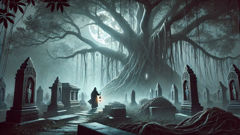Introduction
In the heart of medieval Denmark, the land unfolded in gentle hills and endless meadows, where wildflowers shivered in the northern wind and deep forests cast their cool shade over centuries-old secrets. The villages here were modest clusters of thatched-roof cottages, their people bound to the earth by toil and tradition. Every evening, smoke curled from chimneys and mingled with the dusk, as families gathered by hearths to share stories—tales that carried the wisdom and warnings of generations past. Among these legends, none was whispered more solemnly than the tale of two brothers who once dwelled on the village’s edge, their fate forever entwined with a hidden trove of gold buried deep within the woods.
The brothers, Soren and Rasmus, were sons of a poor but honest farmer. Orphaned young, they inherited little beyond a modest cottage, a patch of land choked with stones, and a bond shaped by hardship. Though different in temperament—Soren was cautious and thoughtful, while Rasmus brimmed with restless ambition—they tilled the same field, shouldered the same burdens, and shared every crust of bread. Yet, as seasons passed and the land yielded little, the hunger for more began to grow in Rasmus’s heart. Soren, content with enough to live, often found his younger brother staring at the woods with a longing that seemed to reach beyond the visible world.
That forest, dense with ancient oaks and twisted roots, was a realm of shadows and secrets. Villagers spoke of treasures hidden by outlaws, of spirits that protected what man was never meant to find. Most dismissed such tales as nonsense—except on nights when the wind moaned through the branches or when a fox’s scream echoed like a warning. Soren heeded these old fears; Rasmus scoffed at them, drawn by dreams of fortune. Fate, as the old stories say, listens for such dreams and sometimes answers in ways no one expects. One fateful day, while clearing brambles at the forest’s edge, the brothers’ spade struck something hard. They knelt together, scraping away soil until their fingers touched the cold, ancient surface of a chest bound in iron and sealed with a rusted lock. Inside—once pried open with trembling hands—lay more gold than either had ever imagined: coins from distant lands, goblets encrusted with jewels, and chains that glimmered like captured sunlight.
The world seemed to pause in that instant, the hush of the forest pressing close. The brothers looked at each other—at first in wonder, then with a question unspoken but heavy in the air: what now? Their discovery was a promise and a test, a blessing and a curse. As the sun slipped behind the trees and shadows lengthened over the gold, both men felt something shift between them—a flicker of suspicion, a glint of greed. The path they chose from that moment would echo far beyond their lifetimes, a lesson carried by the wind and retold by every fire in the land.
Roots of Brotherhood and the Seed of Greed
The days after their discovery blurred together as if the world outside their small cottage no longer existed. Every morning, Soren and Rasmus awoke before dawn, nerves humming with anticipation. They’d tucked the chest beneath the floorboards, careful to mask any trace of disturbed earth. At night, when the wind rattled the shutters, they’d take out a handful of coins, letting the golden discs spill through their fingers by firelight, their minds alive with dreams of what this treasure could buy: new fields, a grand home, rich food, fine horses, even a place among the village’s wealthiest.

Yet beneath the surface, unease grew. Rasmus was the first to voice it. “We must tell no one,” he urged, eyes glinting. “If word spreads, the village elders will come and claim it. The priest will say it belongs to God. Even our neighbors might turn against us.” Soren nodded, but his agreement felt heavy. He’d always believed in sharing burdens, in trusting others, but now he saw how gold could turn even honest men’s hearts. That night, he dreamt of foxes slinking through the woods, their eyes sharp and hungry.
They began to spend more time in the forest, each suspicious of being watched. Rasmus devised hiding places for the gold—first beneath the floor, then inside a hollowed stump deep among the trees. Soren objected, worried that moving the treasure would only draw attention. “If we trust each other, there’s no need for such tricks,” he insisted. But Rasmus wouldn’t be swayed, convinced that even his brother might one day betray him. The gold, once a symbol of fortune, now seemed to whisper lies into their ears.
One rain-soaked afternoon, as Soren returned from the market, he found Rasmus sitting by the hearth, counting coins. The chest was open, and Soren realized some pieces were missing. "Did you take some?" he asked. Rasmus bristled. "Why shouldn’t I? It’s as much mine as yours. Have you not done the same?" The words stung, and suspicion grew like mold in a dark room. Each began to keep secret watch on the other, guarding the gold as much from their own kin as from outsiders.
Their work in the fields suffered. Neighbors whispered about the brothers’ withdrawn manner and the growing neglect of their land. Where once their laughter had echoed through the valley, now only silence fell between them. Even simple tasks—drawing water, repairing the roof—became sources of contention. Rasmus accused Soren of hoarding, Soren accused Rasmus of plotting. At night, neither slept well, haunted by dreams of thieves, curses, and the cold gleam of coins slipping through their fingers.
The gold’s presence became a third shadow in their cottage—a silent judge turning brotherly trust into rivalry. The seed of greed, once planted, burrowed deep, twisting their hearts and clouding every memory of shared hardship. Yet neither could let go of the treasure, nor the hope that it would one day deliver them from poverty and pain. In clinging to their newfound fortune, they began to lose what truly mattered: their bond, their peace, and the quiet joys of a life lived together.
The Web Tightens: Mistrust and Betrayal
Summer waned, and with each passing week, Soren and Rasmus grew further apart. Their secret gnawed at them, making them restless and irritable. The fields turned wild with weeds as their attention drifted from honest labor to ceaseless worry over the treasure. Even when together, their words were sharp and clipped, their glances wary.

One evening, while Soren was patching the leaking roof alone, he caught Rasmus slipping into the forest. At first, he tried to dismiss his brother’s secrecy as nerves. But after a sleepless night, he followed Rasmus’s tracks at dawn. Hidden among the ferns, Soren watched as Rasmus unearthed the chest, counting each coin as if trying to memorize its weight. He returned home with a pouch clinking softly at his side.
A pit opened in Soren’s stomach. Doubts that once seemed unthinkable now took root. That day, he confronted Rasmus. “Why take the coins?” he demanded. “Isn’t our pact enough?” Rasmus’s face hardened. “And what of you? You think I don’t notice how you watch me? How you ask about every coin? Maybe you’d rather I have nothing at all.” Their voices rose, echoing through the empty cottage. The argument ended with slammed doors and bitter silence.
That night, Soren lay awake, haunted by memories of their childhood: how they’d raced through meadows in spring, built shelters from branches, shared dreams by starlight. How had they come to this? He wished for the courage to abandon the gold entirely, to bury it once more and never look back. But fear and pride held him fast. In secret, he began visiting the chest himself, counting coins to be sure none were missing.
Rasmus, too, sensed the distance growing. He became convinced Soren would one day betray him—turn him in, or worse, steal the treasure outright. Paranoia took root. He hid coins beneath loose stones, inside walls, even under his mattress. When Soren left for the village, Rasmus would search the cottage for signs of theft, his heart racing with every creak and groan of the old timbers.
One afternoon, a traveler appeared in the village—a ragged peddler with a sharp tongue and sharper eyes. Over mugs of ale, he spoke of bandits in the woods, of hidden fortunes, of men ruined by greed. Soren listened from a corner, his heart pounding as villagers glanced his way. Had someone seen them? Was their secret already known? That evening, he hurried home, only to find Rasmus gone—and the hollow oak empty.
Panic seized him. He scoured the woods until moonrise, calling for his brother. At last, he found Rasmus by the riverbank, feverishly digging a new hole. The chest was open, coins scattered in the dirt. The brothers faced each other, breathless and wild-eyed. “We can’t keep running like this,” Soren pleaded. “This gold is tearing us apart.” But Rasmus was beyond reason, clutching at the treasure as if it alone could save him from his fears.
Their shouting echoed through the trees, drawing unseen eyes—perhaps animals, perhaps something older. In their struggle, they didn’t notice the storm building above or the strange hush that settled over the woods. The gold had become their world—a world shrinking with every accusation, every sleepless night.
The Price of Greed: Tragedy Unfolds
As autumn’s chill crept into the valley, the brothers’ feud reached its breaking point. Leaves fell in showers of gold and crimson, but the world felt colder than ever. The villagers grew wary of the pair, sensing something dark in their eyes and strange in their manner. Children whispered that the brothers were cursed; old men shook their heads, recalling tales of men who’d lost everything for a handful of coins.

Rasmus became increasingly reckless. He visited the treasure at all hours, sometimes carrying away coins to bury in secret places he didn’t trust even Soren to know about. He started spending money in the village—nothing grand, just a new cloak here, a silver buckle there—but enough to rouse curiosity. Soren warned him to be careful, but Rasmus bristled. “What’s the point of gold if we never use it?” he spat. “Or do you plan to keep it hidden until we’re dead?”
One night, Soren awoke to find the chest missing entirely. Panic and rage churned within him. He scoured every hiding place he knew—inside hollow trees, under roots, beneath stones—but the gold was nowhere. At dawn, he confronted Rasmus, who denied everything at first. But Soren’s fury broke through his brother’s defenses. “You stole it from me!” Soren shouted. “You’d rather see me penniless than share!” Rasmus snapped back, “You never trusted me! You watched me like a thief, so why not become one?”
That argument turned physical. In the red light of sunrise, the brothers grappled in the muddy yard, fists flying and curses ringing through the air. When they finally staggered apart, breathless and bruised, something fragile had shattered between them. Neither apologized; neither yielded. From that day, they barely spoke, living under one roof like strangers bound by a terrible secret.
Days later, Soren overheard villagers talking about strangers seen near the woods. Fearful that outsiders would discover the treasure—or worse, that Rasmus would betray him to them—he hatched a desperate plan. That night, while Rasmus slept, Soren crept from bed, armed with a spade and a heavy heart. He would move the gold one final time, to a place only he knew.
But Rasmus was not truly asleep. He’d sensed his brother’s unease and followed at a distance, slipping through shadows as Soren made his way into the forest. When Soren began to dig at the roots of a twisted yew, Rasmus sprang from hiding, fury burning in his eyes. “So this is your plan?” he hissed. “Steal it all for yourself?”
Their voices rose in the dark, each accusing the other of betrayal. In the heat of anger, reason deserted them. The struggle was brief but brutal—spade against fist, desperate hands clutching at one another. In the end, it was an accident: Soren stumbled, Rasmus shoved him away, and Soren struck his head on a jagged stone.
For a heartbeat, the forest was silent. Then Rasmus knelt beside his brother, horror dawning as he realized what he’d done. Soren’s breath came shallow and quick, his eyes glazed with pain. “Why?” he whispered. But there was no answer.
Rasmus tried to staunch the bleeding, but it was hopeless. As dawn broke through the trees, Soren slipped away, his last breath misting in the cold air. Rasmus wept—first in shock, then in grief too deep for words. All around him, coins gleamed in the soil, as cold and unforgiving as fate itself.
Alone and broken, Rasmus gathered what gold he could and fled into the forest, chased by memories and the certainty that he could never return. The treasure that had promised salvation had delivered only ruin. In time, villagers found the empty cottage and pieced together what little they could: two brothers, driven mad by greed, swallowed by the woods and lost to all who loved them.
Conclusion
The story of Soren and Rasmus echoes long after their footsteps faded from the earth. In the years that followed, villagers told their tale as a warning: that wealth earned too easily can poison even the closest bonds. The forest eventually reclaimed their cottage, moss growing over broken stones and wildflowers blooming where laughter once rang. Some say that on moonlit nights, you can hear whispers among the trees—the voices of two brothers mourning what they lost.
The gold remained hidden, its location lost to time and memory. Sometimes children searching for berries would stumble upon a gleaming coin or a jeweled cup half-buried in roots, but no one ever found the chest again. It was as if the earth itself conspired to keep it out of human hands, a silent testament to what greed and suspicion can cost.
Soren and Rasmus are remembered not for their fortune but for their folly. Their tragedy became a lesson: that trust is more precious than treasure, that love cannot be bought or stored away in secret places. In chasing riches, they lost everything that made life worth living. And so their story endures—passed from parent to child by firelight, retold in every season of hunger and hope—reminding all who hear it that wisdom outlasts gold, and that the truest wealth is found not in what we own, but in how we hold one another close.













